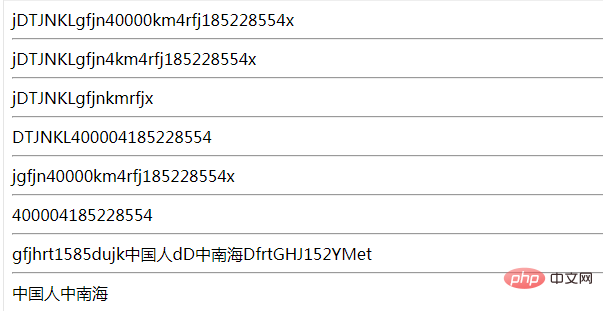
This article uses several examples to learn the preg_replace function and understand its basic usage. It has certain reference value. Friends in need can refer to it. I hope it will be helpful to everyone.
PHP preg_replace() example
<?php
$str="jDTJNKLgfjn40000km4rfj185228554x";
echo $str;
echo '<hr>';
echo preg_replace("/0/","",$str);//去掉0字符,此时相当于replace的功能, preg_replace("/0/","A",$str); 这样就是将0变成A的意思了
echo '<hr>';
echo preg_replace("/[0-9]/","",$str);//去掉所有数字
echo '<hr>';
echo preg_replace("/[a-z]/","",$str); //这样是去掉所有小写字母
echo '<hr>';
echo preg_replace("/[A-Z]/","",$str); //这样是去掉所有大写字母
echo '<hr>';
echo preg_replace("/[a-z,A-Z]/","",$str); //这样是去掉所有字母
echo '<hr>';
$cmcc="gfjhrt1585dujk中国人dD中南海DfrtGHJ152YMet";
echo $cmcc;
echo '<hr>';
echo preg_replace("/[a-z,A-Z,0-9]/","",$cmcc); //去掉所有字母和数字
?>
From this example we can intuitively see the usage of the preg_replace function. You can also see that the matching string must be added with / / (see the first parameter of the example). Without adding / /, there is no way to remove the numbers and letters we want to remove.
<?php
$str="jDT<JNKLgfjn40000km4rfj18>5228554x";
echo preg_replace("/<.*>/","",$str);
?>This means removing the part starting with & and ending with >. The output result is: jDT5228554x.
Note: .* means any character, which means that no matter what the <> package is, it will be removed. . represents any character, * represents any number.
<?php
$str="sfrjjd<55555555>sc<6666>sd<>cd";
echo preg_replace("/<[0-9]*>/","",$str);//输出sfrjjdscsdcd
echo "<hr>";
echo preg_replace("/<[0-9]+>/","",$str);//输出sfrjjdscsd<>cd
?>This example shows the difference between * and , * means repeating 0 or n times, and means at least once, that is, means must contain at least Only one number qualifies.
I believe you all know at this time why the output results of the same string using different characters are different.
Recommended learning: "PHP Video Tutorial"
The above is the detailed content of A brief discussion on the usage of PHP regular replacement function preg_replace. For more information, please follow other related articles on the PHP Chinese website!